Papers by Robert Schweitzer
Faculty of Education, Feb 1, 2006
Robert (2006) The contested terrain of teachers detecting and reporting child abuse and neglect: ... more Robert (2006) The contested terrain of teachers detecting and reporting child abuse and neglect: The need for empirical research in an Australian state with unique reporting laws.

sampling, sexual desire, ageing, ethics Objective Sexual desire experienced by people over 65 yea... more sampling, sexual desire, ageing, ethics Objective Sexual desire experienced by people over 65 years of age is a sensitive topic deserving serious and ethical research. The recruitment of participants into a potentially sensitive study poses particular difficulties including ethical challenges such as informed consent and confidentiality. This paper, drawing on a study of sexual desire in an older aged population group, outlines a range of purposive sampling methods that resulted in a high rate of recruitment, thus validating the methodology employed. The paper reports the outcomes of four recruitment strategies: word of mouth, advertising, community‑based seminars and Sampling methods: methodological issues involved in the recruitment of older people into a study of sexuality direct solicitation that were employed in a study on sexual desire and ageing. The paper aims to encourage researchers and health professionals to consider looking more closely at topics often considered to be ...

The purpose of this best-practice Framework is to promote effective and comprehensive assessment ... more The purpose of this best-practice Framework is to promote effective and comprehensive assessment and practice when working with recently resettled Women-at-Risk from refugee backgrounds and their families. The Framework aims to inform policy makers, service agencies, and practitioners working with the women, primarily focused on women whose time in Australia is eighteen months or less. While there is a small body of evidence regarding the settlement of this group of women, links between research evidence and practice are relatively limited and a coherent theoretically-informed and evidence-based framework that assesses and responds in supporting the women does not currently exist. To improve service delivery and promote positive outcomes for Women-at-Risk in their resettlement, the Framework seeks to: (a) Appreciate the intersecting nature of issues that characterise the experiences of the women; (b) Improve understandings of the links between research and practice for policy makers, service agencies, and practitioners; (c) Recognise collaborative processes that build from the resources and expertise of diverse individuals, communities, and practitioners to support women; (d) Devise practice principles and guidelines to assist policy makers, service agencies, and practitioners address the needs of the women effectively; (e) Assist quality control processes for practitioners, service agencies, and government.
Journal of Immigrant & Refugee Studies, 2020
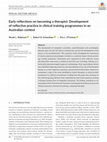
Counselling and Psychotherapy Research, 2019
The past few decades have seen the beginning of process-oriented research on students' experience... more The past few decades have seen the beginning of process-oriented research on students' experience of training in counselling, clinical psychology and psychotherapy. Renewed interest in common factors contributing to client outcomes has emphasised the salience of the "person" delivering therapy compared to the traditional perspective of treatment techniques (Stamoulos et al., 2016; Tschacher, Junghan, & Pfammatter, 2014; Wampold, 2015). These findings have triggered a reconceptualisation of the role of training therapists beyond binary categorisations between common factors and specific techniques, emphasising a need for increased understanding of the experiences that underpin clinical training. Despite the acknowledged view that therapist variables contribute to client outcomes (e.g., Wampold, 2015), there is a need to focus on understanding what these variables are, how they interact and how they are fos
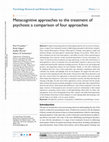
Psychology Research and Behavior Management, 2018
In light of increasing interest in metacognition and its role in recovery from psychosis, a range... more In light of increasing interest in metacognition and its role in recovery from psychosis, a range of new treatments focused on addressing metacognitive deficits have emerged. These include Metacognitive Therapy, Metacognitive Training, metacognitive insight and reflection therapy, and metacognitive interpersonal therapy for psychosis. While each of these treatments uses the term metacognitive, each differs in terms of their epistemological underpinnings, their structure, format, presumed mechanisms of action, and primary outcomes. To clarify how these treatments converge and diverge, we first offer a brief history of metacognition as well as its potential role in an individual's response to and recovery from complicated mental health conditions including psychosis. We then review the background, practices, and supporting evidence for each treatment. Finally, we will offer a framework for thinking about how each of these approaches may ultimately complement rather than contradict one another and highlight areas for development. We suggest first that each is concerned with something beyond what people with psychosis think about themselves and their lives. Each of these four approaches is interested in how patients with severe mental illness think about themselves. Each looks at immediate reactions and ideas that frame the meaning of thoughts. Second, each of these approaches is more concerned with why people make dysfunctional decisions and take maladaptive actions rather than what comprised those decisions and actions. Third, despite their differences, each of these treatments is true to the larger construct of metacognition and is focused on person's relationships to their mental experiences, promoting various forms of self-understanding which allow for better selfmanagement. Each can be distinguished from other cognitive and skills-based approaches to the treatment of psychosis in their emphasis on sense-making rather than learning a new specific thing to say, think, or do in a given situation.
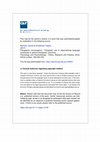
Psychology and psychotherapy, 2017
Reflexivity is the process of critically examining one's own experience. Emerging literature ... more Reflexivity is the process of critically examining one's own experience. Emerging literature suggests that reflexivity is a positive predictor of outcomes in psychotherapy. However, limited research has been conducted regarding therapists' use of reflexivity as a therapeutic technique. In particular, we have a limited understanding of how therapists use language to initiate reflexive conversations. This study investigates the characteristics of therapist language that elicit reflexivity focused on internal and external processes. Therapeutic outcomes of 42 trainee-therapists who provided psychotherapy to 173 clients were tracked with the OQ-45.2 with the view of identifying client-trainee-therapist dyads (CTTDs) with the best and poorest outcomes. Six best outcome and six poorest outcome CTTDs were identified. Thirty-six therapy transcripts were initially coded with the Narrative Process Coding System to identify each Narrative Process Mode (NPM). Sixty external, internal, a...

Psychology and psychotherapy, Jan 24, 2017
This study investigated long-term outcomes of Metacognitive Narrative Psychotherapy. Previous stu... more This study investigated long-term outcomes of Metacognitive Narrative Psychotherapy. Previous studies have shown the approach to be effective in enhancing recovery and metacognition in people with a diagnosis of schizophrenia. A 2-year longitudinal follow-up case study design. Eight people with a diagnosis of schizophrenia received an average of 52 sessions over 13-26 months. Follow-up interviews were conducted and self-report measures administered at approximately 2 years (22-30 months) post-completion of therapy. The majority of participants demonstrated reliable improvement from pre-treatment to 2-year follow-up on one or more of the outcome measures with some variation in patterns of improvement. This study provides the first evidence that therapeutic gains in recovery and metacognition during Metacognitive Narrative Psychotherapy for people with a diagnosis of schizophrenia can be maintained at 2-year follow-up. Larger, controlled trials are warranted to ascertain the most impo...

Counselling and Psychotherapy Research, Sep 1, 2015
Free to read Background Contemporary psychotherapy research demonstrates that whilst most clients... more Free to read Background Contemporary psychotherapy research demonstrates that whilst most clients respond positively to psychological interventions, a small, but significant proportion of clients fail to experience the expected benefits of therapy. Although methodologies exist that enable the identification of successful and unsuccessful therapy, we have a limited understanding of the processes associated with these outcomes. Aim The current study sought to examine the relationship between therapeutic outcome and therapeutic language. Methodology: The therapeutic outcomes of 42 trainee-therapists who provided psychotherapy to 173 clients were tracked with the OQ-45.2 over a 5 year period with the view of identifying the client/ trainee-therapist dyads with the best and poorest outcomes. The 6 best outcome and 6 poorest outcome client/ trainee-therapist dyads were identified in order to examine the characteristics of therapeutic conversations associated with better and poorer therapy outcomes. Therapeutic conversations were analysed with the Narrative Process Coding System. Findings The best outcome client/ trainee-therapist dyads demonstrated significant increases in reflexive conversation over the course of psychotherapy. Implications Examining the practices of the best and poorest outcome client/ trainee-therapist dyads with objective measures of therapy outcome provides an important first step in understanding how therapeutic language may contribute to the greatest therapeutic improvement or deterioration.

This study examined the effects of personal and social resources, coping strategies and appraised... more This study examined the effects of personal and social resources, coping strategies and appraised stress on employees' levels of anxiety and depression. In relation to the effects of resources and coping strategies, two different models were tested. The main effects model proposes that, irrespective of the level of stress, coping resources and coping strategies have direct effects on well-being. In contrast, the buffering model predicts that the buffering effects of coping resources and strategies are only evident at high levels of stress. One hundred lawyers completed a structured self-administered questionnaire that measured their personal and social resources, use of problem-focused and emotion-focused coping strategies, and appraisals of the stressfulness of the situation. Results revealed generally strong support for the main effects model in the prediction of employee levels of anxiety and depression. Lower levels of anxiety were linked to judgements of lower levels of organizational change, greater self-confidence, greater internality of control beliefs and less use of emotion-focused coping strategies. Lower levels of depression in employees were also linked to judgements of lower levels of organizational change, greater use of resources and less appraised stress. There was only limited support for the buffering effects model. Due to the small size of the sample, the findings need to be explored further in other contexts.

Administration and policy in mental health, Jan 28, 2017
This study investigated the relationship between two therapist attributes (reflective functioning... more This study investigated the relationship between two therapist attributes (reflective functioning and attachment style) and client outcome. Twenty-five therapists treated a total of 1001 clients. Therapists were assessed for reflective functioning and attachment style using the Adult Attachment Interview and the Experiences in Close Relationships Scale. Clinical outcome was measured using the Outcome Questionnaire (OQ-45). Data were analysed using hierarchical linear modelling. Results indicated that therapist reflective functioning predicted therapist effectiveness, whereas attachment style did not. However, there was evidence of an interaction between therapist attachment style and therapist reflective functioning. Secure attachment compensated somewhat for low reflective functioning and high reflective functioning compensated for insecure attachment. Possible implications for the selection of therapy training candidates and therapist training are discussed.

British Journal of Guidance & Counselling, 2015
ABSTRACT The present study is the first study undertaken in Australia that seeks to explore pract... more ABSTRACT The present study is the first study undertaken in Australia that seeks to explore practitioners’ perspectives on the use of clinical supervision in their therapeutic engagement with asylum seekers and refugees. We used thematic analysis to analyse extracts of interviews that were conducted with nine professionals who worked therapeutically with asylum seekers and refugees and had experience of participating in individual and peer supervision. The findings of the study suggest that supervision encouraged practitioners to develop multicultural awareness and explore therapeutic ways of working that are compatible with their clients’ frame. In addition, supervision provided the context in which practitioners explored the impact of the asylum legislative framework on their clinical work and reflected upon their feelings of powerlessness and political impotence. Implications for practice that derive from supervisory needs of practitioners who work with asylum seekers and refugees are explored.
This is the author’s version of a work that was submitted/accepted for pub-lication in the follow... more This is the author’s version of a work that was submitted/accepted for pub-lication in the following source:
Australian Psychologist, 2021
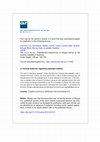
Public Health, 2018
Objectives: Refugee women entering resettlement countries on woman-at-risk visas represent a part... more Objectives: Refugee women entering resettlement countries on woman-at-risk visas represent a particularly vulnerable population. While their specific gender-based resettlement will likely differ from the general refugee population, little is known about their experiences of early resettlement, with which to inform resettlement policy and practice. This research aimed to explore lived experiences of recently-resettled refugee women-at-risk in Australia. Study design: Qualitative research employed focus groups and a Framework Approach to identify and explicate common themes in participants' experience. Methods: Two focus groups with a purposive sample of African and Afghan refugee women-at-risk (N = 10), aged 22 to 53 years old, were conducted in SouthEast Queensland, Australia (October 2016), recruited with the assistance of a local resettlement service. Discussions were audiotaped, transcribed, and themes explicated. Results: Six superordinate themes emerged: (1) Sentiment of gratitude; (2) Sense of loneliness and disconnection; (3) Feeling incapable; (4) Experiencing distress and helpseeking; (5) Experiencing financial hardship, and; (6) Anticipating the future. Conclusions: Findings indicate resettlement policy, programs, and practice that explicitly target the needs of women-at-risk refugees are warranted, including a longer period of active service provision with specific attention to strategies that address the women's social connection, self-efficacy, emotional well-being, and financial hardships.

Frontiers in psychology, 2018
Drawing upon phenomenology and psychoanalytic concepts, we explore and explicate participants'... more Drawing upon phenomenology and psychoanalytic concepts, we explore and explicate participants' lived experience of the natural world. The authors draw upon Husserl's description of consciousness as intentionality and his later work on the life-world, in exploring experiences which provide a basis for a psychochoanalytic understanding of the human-nature experience. Unstructured interviews were undertaken with nine participants, each of whom regarded nature as being significant for their sense of wellbeing. The lived experiences were explicated drawing upon the two processes: Giorgi's descriptive phenomenological psychological methodology and psychoanalytic researcher reflexivity. Data analysis and explication involved the following steps: (1) a thorough reading of each interview transcript, (2) breaking data into parts by demarcating meaning units, (3) organizing data by translating meaning units into units of psychological experience through coding, and (4) arriving at ...
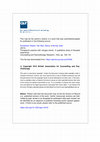
Counselling and Psychotherapy Research, 2015
Background: There is limited research on the subjective experience of therapists and their unders... more Background: There is limited research on the subjective experience of therapists and their understanding of therapeutic process when working with people from refugee backgrounds. Objective: The present study provides a qualitative account of therapists' conceptions of therapeutic practice and experiences of working therapeutically with refugee clients. Method: Participants were 12 mental health workers who had worked therapeutically with people from refugee backgrounds, with an average of 7.6 years (range 1.5-16 years) experience in this field. Participants completed a semi-structured interview and completed a brief quantitative survey. Findings: Thematic analysis revealed a number of super-ordinate themes. Four key themes are explored in the current study: principles of therapeutic practice; therapy as a relational experience; the role of context in informing therapeutic work with refugee clients; and the impact of therapeutic work on the therapist. Discussion: The results revealed the complexity and demands of working with people from refugee backgrounds. Further, the lack of research evidence for the methods of therapeutic practice described in the current study highlights the distinction between naturalistic therapeutic practice and the current state of the evidence regarding therapeutic interventions for refugee clients. The findings have important implications for training and supporting therapists to work with people who have fled their countries of origin and who have often been exposed to highly traumatic events.
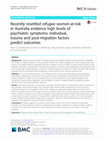
BMC Medicine, 2018
Background: Despite increasing numbers of refugee women-at-risk being resettled and their potenti... more Background: Despite increasing numbers of refugee women-at-risk being resettled and their potential vulnerability, there exists no empirical research into the psychiatric health of this unique subgroup with which to guide policy and practice. This research aimed to investigate psychiatric symptom status of a sample of refugee women-at-risk recently resettled in Australia, as well as factors contributing to symptoms of trauma, anxiety, depression, and somatization. The level of psychiatric symptomatology is compared to reference groups of women from Sudan and Burma, who entered Australia under the Humanitarian Entry Programme, and who did not meet criteria as women-at-risk. Methods: This is a cross-sectional survey of 104 refugee women-at-risk across several ethnic groups including a demographic questionnaire, the Harvard Trauma Questionnaire, Post-migration Living Difficulties Checklist, and Hopkins Symptom Checklist to assess individual factors, traumatic experiences, post-migration problems, and symptoms of trauma, anxiety, depression, and somatization. A series of multiple hierarchical regression analyses examined factors predicting psychiatric symptoms. Results: Substantial proportions of participants reported psychiatric distress in symptomatic ranges, including for traumatization (41%), post-traumatic stress disorder (20%), anxiety (29%), and depression (41%), as well as significant symptoms of somatization (41%). These findings are significantly higher than those derived from reference groups of women from Sudan or Burma, resettled in the same area and utilizing a similar methodology. Higher numbers of trauma events and post-migration living difficulties predicted higher trauma, depression, and somatic (but not anxiety) symptoms. Having children predicted higher trauma, anxiety, and somatic symptoms. Greater English fluency predicted higher anxiety symptoms. Region of birth predicted anxiety and depression symptoms. Age predicted trauma and anxiety symptoms. Conclusions: Findings suggest that recently arrived refugee women-at-risk are at high risk of psychiatric disorders. The results indicate a need for comprehensive psychiatric assessment to identify women in need of treatment very early after resettlement, with implications for medical practice, service delivery, and policy programs.





Uploads
Papers by Robert Schweitzer